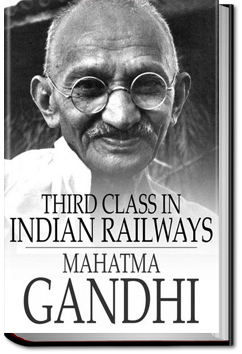

Among the many suggestions that can be made for dealing with the evil here described, I would respectfully include this: let the people in high places, the Viceroy, the Commander-in-Chief, the Rajas, Maharajas, the Imperial Councillors and others, who generally travel in superior classes, without previous warning, go through the experiences now and then of third class travelling. We would then soon see a remarkable change in the conditions of third class travelling and the uncomplaining millions will get some return for the fares they pay under the expectation of being carried from place to place with ordinary creature comforts.
[1] Ranchi, September 25, 1917.
It is to be hoped that Dr. Mehta's labour of love will receive the serious attention of English-educated India. The following pages were written by him for the Vedanta Kesari of Madras and are now printed in their present form for circulation throughout India. The question of vernaculars as media of instruction is of national importance; neglect of the vernaculars means national suicide. One hears many protagonists of the English language being continued as the medium of instruction pointing to the fact that English-educated Indians are the sole custodians of public and patriotic work. It would b
Get ALL YOU CAN BOOKS absolutely FREE for 30 days. Download our FREE app and enjoy unlimited downloads of our entire library with no restrictions.
Have immediate access and unlimited downloads to over 200,000 books, courses, podcasts, and more with no restrictions.
Everything you download during your trial is yours to keep and enjoy for free, even if you cancel during the trial. Cancel Anytime. No risk. No obligations.
For just $24.99 per month, you can continue to have unlimited access to our entire library. To put that into perspective, most other services charge the same amount for just one book!

As avid readers, we understand the joy of immersing ourselves in a captivating story or getting lost in the pages of a good book. That's why we founded All You Can Books back in 2010, to create a platform where people can access an extensive library of quality content and discover new favorites.
Since our founding days, we’ve continuously added to our vast library and currently have over 200,000 titles, including ebooks, audiobooks, language learning courses, podcasts, bestseller summaries, travel books, and more! Our goal at All You Can Books is to ensure we have something for everyone.
Join our community of book lovers and explore the world of literature and beyond!